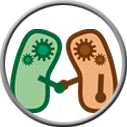Team:Calgary/Notebook/Protocols/Process6
From 2011.igem.org
(Difference between revisions)
Rpgguardian (Talk | contribs) |
|||
| (5 intermediate revisions not shown) | |||
| Line 2: | Line 2: | ||
{{Team:Calgary/Notebookbar| | {{Team:Calgary/Notebookbar| | ||
| - | TITLE=Glass Bead Algal | + | TITLE=Glass Bead Algal Transformation| |
BODY=<html> | BODY=<html> | ||
| + | |||
| + | <p>This protocol is adapted from the Feng <i>et al.</i> (2009) publication in Molecular Biology Reports.</p> | ||
<p>Reagents and Materials</p> | <p>Reagents and Materials</p> | ||
| Line 13: | Line 15: | ||
<li>Glass beads (0.45-0.52mm diameter)</li> | <li>Glass beads (0.45-0.52mm diameter)</li> | ||
<li>Conc. sulfuric acid</li> | <li>Conc. sulfuric acid</li> | ||
| - | <li> | + | <li>ddH<sub>2</sub>O</li> |
<li>20% (w/v) PEG solution</li> | <li>20% (w/v) PEG solution</li> | ||
<li><i>D. salina</i> culutre (log phase)</li> | <li><i>D. salina</i> culutre (log phase)</li> | ||
| Line 21: | Line 23: | ||
<p> | <p> | ||
<ol> | <ol> | ||
| - | <li>A solution containing 20% (w/v) PEG was prepared and then added to cells of D. salina before transformation. </li> | + | <li>A solution containing 20% (w/v) PEG was prepared and then added to cells of <i>D. salina</i> before transformation. </li> |
<li>Glass beads, 0.45– 0.52 mm in diameter, were washed with concentrated sulfuric acid, then rinsed thoroughly with distilled water, and dried by baking at 180°C for 2–3 h. </li> | <li>Glass beads, 0.45– 0.52 mm in diameter, were washed with concentrated sulfuric acid, then rinsed thoroughly with distilled water, and dried by baking at 180°C for 2–3 h. </li> | ||
| - | <li>D. salina cells were cultured to logarithmic phase and then harvested by centrifugation at 5,000 rpm for 2 min. </li> | + | <li><i>D. salina</i> cells were cultured to logarithmic phase and then harvested by centrifugation at 5,000 rpm for 2 min. </li> |
<li>Cells were washed three times with the liquid medium as mentioned above, and resuspended with this medium at a concentration of 105 cells/ml. </li> | <li>Cells were washed three times with the liquid medium as mentioned above, and resuspended with this medium at a concentration of 105 cells/ml. </li> | ||
| - | <li>A mixture with 300 mg glass beads, 40 µg vector DNA (0.4 µg/µl) and 100 µl PEG was added to 0.8 ml of D. salina cell culture, mixed briefly by gently inverting tube and then agitated at 2,000 rpm on a vortex for 6 sec in 1.5 ml centrifuge tubes.</li> | + | <li>A mixture with 300 mg glass beads, 40 µg vector DNA (0.4 µg/µl) and 100 µl PEG was added to 0.8 ml of <i>D. salina</i> cell culture, mixed briefly by gently inverting tube and then agitated at 2,000 rpm on a vortex for 6 sec in 1.5 ml centrifuge tubes.</li> |
<li>The glass beads were allowed to settle, and cells were transferred to sterilized test tubes and cultured in liquid medium under dim light condition for 24 h. </li> | <li>The glass beads were allowed to settle, and cells were transferred to sterilized test tubes and cultured in liquid medium under dim light condition for 24 h. </li> | ||
Latest revision as of 04:10, 29 September 2011









Glass Bead Algal Transformation

This protocol is adapted from the Feng et al. (2009) publication in Molecular Biology Reports.
Reagents and Materials
Protocol
- A solution containing 20% (w/v) PEG was prepared and then added to cells of D. salina before transformation.
- Glass beads, 0.45– 0.52 mm in diameter, were washed with concentrated sulfuric acid, then rinsed thoroughly with distilled water, and dried by baking at 180°C for 2–3 h.
- D. salina cells were cultured to logarithmic phase and then harvested by centrifugation at 5,000 rpm for 2 min.
- Cells were washed three times with the liquid medium as mentioned above, and resuspended with this medium at a concentration of 105 cells/ml.
- A mixture with 300 mg glass beads, 40 µg vector DNA (0.4 µg/µl) and 100 µl PEG was added to 0.8 ml of D. salina cell culture, mixed briefly by gently inverting tube and then agitated at 2,000 rpm on a vortex for 6 sec in 1.5 ml centrifuge tubes.
- The glass beads were allowed to settle, and cells were transferred to sterilized test tubes and cultured in liquid medium under dim light condition for 24 h.

 "
"






